新概念第二册 Lesson 1 讲义教师版
新概念第二册Lesson1 A private conversation详解

Lesson1 A private conversationprivate adj. 私人的conversation n. 谈话theatre n. 剧场,戏院seat n. 座位play n. 戏loudly adv. 大声地angry adj. 生气的angrily adv. 生气地attention n. 注意bear v. 容忍business n. 事rudely adv. 无礼地,粗鲁地Last week I went to the theatre. I had a very good seat. The play was very interesting. I did not enjoy it. A young man and a young woman were sitting behind me. They were talking loudly. I got very angry. I could not hear the actors. I turned round.I looked at the man and the woman angrily. They did not pay any attention. In the end, I could not bear it. I turned round again. "I can't hear a word!" I said angrily."It's none of your business," the young man said rudely. "This is a private conversation!"参考译文:上星期我去看戏. 我的座位很好, 戏很有意思, 但我却无法欣赏. 一青年男子与一青年女子坐在我的身后, 大声地说着话. 我非常生气, 因为我听不见演员在说什么. 我回过头去怒视着那一男一女, 他们却毫不理会. 最后, 我忍不住了, 又一次回过头去, 生气地说 : “我一个字也听不见了!”“不关你的事, “那男的毫不客气地说, “这是私人间的谈话!”美音:肯定I can否定I can't,它的/t/是吞进去的, 在读音上很难区别, 只能根据上下文来定The writer could not bear it. He could not ______ it.a. carryb. sufferc. standd. liftbear 忍受=standsuffer 遭受,忍受 (精神或肉体上)痛苦,suffer后面必须加一种痛苦I suffer the headache.(肉体上的痛苦)He often suffers defeat.(精神上的痛苦)(defeat n. 失败)单词:1 a.私人的:______________2 n.谈话:______________3 n.剧场,戏院:______________4 n.座位:______________5 n.戏:______________6ad.大声地:______________7a.生气的:______________8ad.生气地:______________9n.注意:______________10v.容忍:______________11n.事:______________12 ad.无礼地,粗鲁地:______________ 词组:默写课文:。
新概念英语第2册:lesson 1- lesson 12核心句型精讲

• 拓展提高:
【Unit 01 My classroom】
• how还可以接整句话表示感叹。
e.g. How I miss my old school!我真想念我的母校!
e.g. How I hate them! 我恨透了他们!
• 及时操练
答案
你真好!
How good you are!/What a good person you are!
【FUronmitt0he1re,Mheywcillal sflsyrotooPmer】th. 从那里, 他再飞往珀斯。
(经典原文:NCE2-L4) (He will soon visit Darwin. From there, he will fly to Perth.)
小贴示: 尽量用简洁的英语来表达意思。语言学中,简洁就 是美。(Brevity is beauty.) 复杂版本:He will go to Perth by plane.
(经典原文:NCE2-L8) 句型解析: 比较级 句子主干(含形容词或副词的比较级)+than + 比较对象 在形容词或副词比较级前面可以加上以下的词来具体修饰程度: far,much,a little, a bit,even等。
• 小贴士
【Unit 01 My classroom】
• 拓展提高
【Unit 01 My classroom】
匆匆忙忙去某地,可以将go to ...in a hurry
简化为:hurry to...
• 及时操练 就在那时,一名男子匆匆忙忙来到售票处。 Just then, a man hurried to the ticket office.
Pinhurst is only five【mUilnesitfr0o1m SMilbyucryla, sbsurt oMor.mS】cott cannot get a telephone for his new garage, so he has just bought twelve pigeons. 平赫特离锡尔伯里只有 5 英里, 但詹姆斯.斯科特先生未能为他新 的汽车修理部搞到一部电话机, 所以他买了只 鸽子.
新概念英语第二册Lesson1

Part4. Summary Writing 常见疑问句提问内容和回答方式 1. Where....: 询问地点。
回答时可以直接写地点或在句子末尾加地点。 2. Who..:询问人物
回答时可以给出人物名称 3. What...: 询问内容
回答时给出具体内容或者用名词回答 4. When...:询问时间
last month/year/morning/evening/night
Last week I went to the theatre. They watched a football game at home last night. He came to China last year. Last month my father bought a new car.
3. 表示动作状态的词语:多放在动词后 (副词) I said angrily. 我生气地说。 The young man said rudely. 那个年轻人粗鲁地说。
4. 描述人、事、物状态或特点的词语:多在名词前或be动词之后 (定语/表语) I got a very good seat. 我有一个好座位。/我的座位很好。(定语) The play was very interesting. 戏很有意思。(表语)
回答时可直接给出时间词语,或者在句子开头/末尾加入时间词语 5. How..:询问方式或状态
回答时给出表示方式的内容或者描述状态的形容词、副词等 6. 一般疑问句:用来确认是否属实
回答时:Yes,主语+疑问词肯定式。/No, 主语+疑问词否定式。
2. 表示动作的频率副词:在动词前 often, usually, always, sometimes, never, rarely She often walked to school when she was twelve years old. 在她十二岁的时候,她常常走着去上学。 He never made noise in the class before. 以前他从不在班里大声喧哗。 频率词组多在动词之后或者句末 once a day/week/month/year twice a day/week/month/year three times a day/week/month/year
新概念英语第二册Lesson1课件
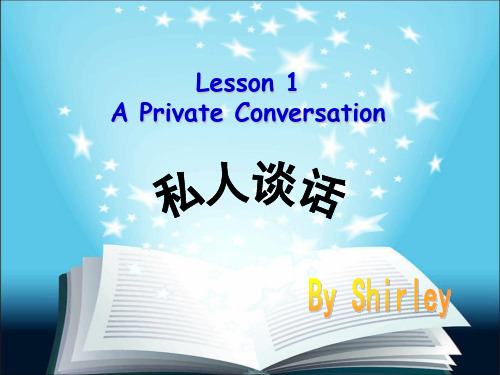
I could not hear the actors.
Key structures and usage
过去进行时:过去某个时间正在进行 或发生的动作 A young and a young woman were sitting behind me.
They were talking loudly.
• • • • • • • • • • • • • • •
【Key structures】 简单陈述句的语序 陈述句一定是有主语,有动词,有宾语,有句号 6 1 2 3 4 5 6 when? Who? Action Who? How? Where? When? Which? Which? What? What? 1 ---主语,一般由名词、代词或名词短语构成,通常位于动词之前,动词必 须与主语一致,即主语决定动词的单复数形式 2 ---谓语,由动词充当 3 ---宾语,一般为名词、代词或名词短语 4 ---副词或介词短语,对方式或状态提问,往往做状语 I like her very much 5 ---地点状语,一般在方式副词之后,时间副词之前 6 ---时间状语,可以放在句首或句末 简单陈述句一定不能少的是主语, 谓语. 如果问何时何地,是一个固定搭配 when and where
• • • • • •
★business n. 事, 生意 ① n. 生意 business man :生意人 do business: 做生意 ② n. 某人自己的私人的事情 It's my business. (指私人的事, 自己处理的 事) • It's none of your business. 不关你的事。
Language points
以下短语中名词前不加冠词:
新概念英语第二册Lesson1完整课件
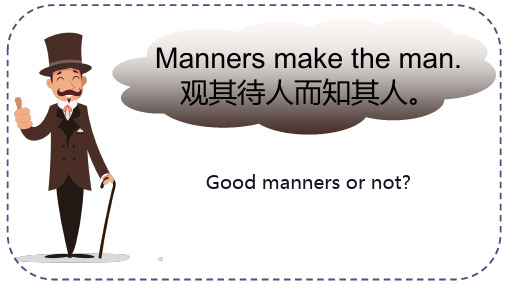
[v.]
seat
seat sb.
[n.]
让某人就坐
have a very good seat
= a very good place
视线无遮挡,所处的位置非常
好,而非椅子本身材料好。
take one's seat
business
1. 事情(私人的) It's none of my business.
adj. 私人的
private school 私立学校
private letter 私人信件
privacy/ˈprɪvəsi/ n.隐私
public adj. 公众的,公开的 public school 公立学校 public place 公众场所
angry
angry adj. 生气的 be angry with sb. 生某人的气 be angry at/about sth. 为某事而生气
interested adj. 对…感兴趣的 be interested in sth/ doing sth. I am interested in sports.
enjoy v.享受…之乐,欣赏,喜爱 enjoy doing sth. enjoy swimming 喜欢游泳 enjoy one's dinner 饭吃得津津有味 enjoy oneself 玩得开心 =have fun=have a good time
late----late far----far
Listening
Why did the writer complain to the people behind him?
Last week I went to the_t_h__e_a_t_r_e_. I had a very good__s_e_a_t_. The play was very interesting. I did not_e_n__j_o_y it. A young man and a young woman were sitting behind me. They were talking_l_o_u__d_l_y_. I got very__a_n_g__r_y_. I could not hear the actors. I turned round. I looked at the man and the woman_a__n_g__ri_l_y_. They did not pay any_a_t_t_e_n__ti_o__n. In the end, I could not bear it. I turned round again. ‘I can't hear a word!’ I said angrily.
新概念英语第二册 lesson 1

lesson 1 A private conversationLesson 1 A private conversation课文内容:Last week I went to the theatre. I had a very good seat. The play was very interesting. I did not enjoy it. A young man and a young woman were sitting behind me. They were talking loudly. I got very angry. I could not hear the actors. I turned round. I looked at the man and the woman angrily. They did not pay any attention. In the end, I could not bear it. I turned round again. ‘I can't hear a word!’ I said angrily.‘It's none of your business, ’ the young man said rudely. ‘This is a private conversation!’Notes on the text 课文注释1 go to the theatre,去看戏。
2 got angry,生气。
3 turn round,转身,也可用turn around。
4 pay attention,注意。
5 I could not bear it.我无法忍受。
其中的it是指上文中的那对男女大声说话又不理会作者的愤怒目光。
6 none of your business,不关你的事。
参考译文:上星期我去看戏。
我的座位很好,戏很有意思,但我却无法欣赏。
新概念英语第二册_lesson_1
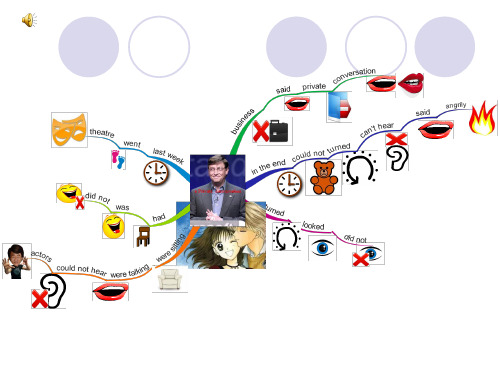
have a conversation about sth Let’s have a conversation about your
performance this semester.
(并列句) 文中 Last week I went to the
theatre.
时间状语 主语 谓语 地点状语
Ⅲ. Text study
Last week I went to the theatre. I had a very good seat. The play was very interesting. I did not enjoy it. A young man and a young woman were sitting behind me. They were talking loudly. I got very angry. I could not hear the actors. I turned round. I looked at the man and woman angrily. They did not pay any attention. In the end, I could not bear it. I turned round again. ‘ I can’t hear a word!’ I said angrily.
间用过去时态顺理成章。故将go改为 went。 [语言点2] 在theatre,cinema,pictures等词 之前一定要加定冠词the。
例如: go to the theatre = go to see the play去
新概念英语第二册第1课讲义老师用

private adj私人的conversation n谈话threatre n剧场,戏院seat n座位play n戏loudly adj大声地angry adj生气的angrily adv生气地attention n注意bear (bore --boren)v容忍business n事rudely adv无礼地,粗鲁地private1adj 私人的(通常做定语修饰名词),(personal)A private conversation私人谈话a private company私有公司a private life私生活a private secretary私人秘书private affairs私事eg That is for your private ear.这是说给你一个人的秘密。
2adj 秘密的(相当于secret)a private place= a secret place 一个秘密的地方conversation n非正式谈话 (an informal talk)have a conversation with sb跟某人谈话eg I had a quiet conversation with my closest friend. 我和我最好的朋友进行密谈。
eg I saw him in conversation with a friend. 我看见他跟朋友谈话。
eg No conversation while I am talking. 我讲话的时候不要谈话。
converse v谈话(不及物动词)converse with sb跟某人谈话talk n v谈话talk with sb / talk to sb跟某人谈话talk with sb about sth跟某人谈talk to sb about sth论某事say vt说(及物动词),后面直接跟说话的内容say sth说了一些话eg He said nothing.他什么也没说。
新概念英语第二册-lesson1课件

12 There are a lot of people at the bus stop. 13 The little boy ate greedily an apple in the
kitchen this morning. 14 She draws beautifully. 15 I like music very much. 16 They built a new school in our village last year. 17 The match ended at four o'clock. 18 She received a letter from her brother last week.
3. The play was very interesting.
[参考翻译] 那场戏剧演得非常有意 思。
[语言点] very 为副词,interesting为 形容词,副词修饰形容词一般放在 其前面。
比如: very hot非常热, quiet easy 十分简单,但good enough 为例外。
have a conversation about sth. 例:Shall we have a conversation
about your vacation ?
同义词:
conversation 无拘束或非正式的 谈话
talk
谈话内容可正式或非正式
chat
闲谈、聊天
discussion (小型的)讨论、商议
like意义要深得多。 enjoy music享受音乐, enjoy dinner享受宴会, enjoy life享受生活
② enjoy doing enjoy swimming 喜欢游泳, enjoy fishing喜爱钓鱼 ③ 一般不可说enjoy sb This morning I enjoyed my English
新概念英语第二册Lesson01Aprivateconversation私人谈话讲义

新概念英语第二册Lesson 01A private conversation私人谈话A private conversationLast week I went to the theatre. I had a very good seat. The play was very interesting.I did not enjoy it. A young man and a young woman were sitting behind me. They were talking loudly. I got very angry. I could not hear the actors. I turned round. I looked at the man and the woman angrily. They did not pay any attention. In the end, I could not bear it.I turned round again. I cant hear a word! I said angrily.Its none of your business, the young man said rudely. This is a private conversation!【课文翻译】私人谈话Last week I went to the theatre.上星期我去看戏。
I had a very good seat. The play was very interesting. I did not enjoy it.我的座位很好,戏很有意思,但我却无法欣赏。
A young man and a young woman were sitting behind me. They were talking loudly.一青年男子与一青年女子坐在我的身后,大声地说着话。
新概念英语第二册 Lesson1 课件
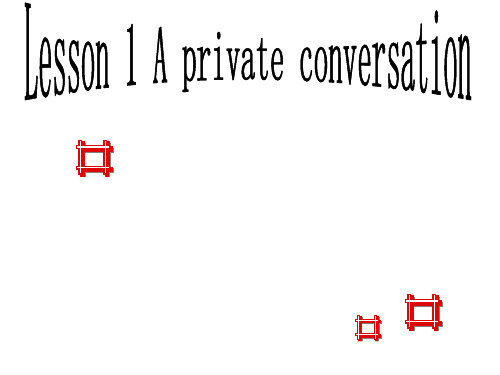
• ★conversation n.谈话(非正式的) They are having a conversation about their holiday.
谈论某事 They are having a conversation with their father.
和某人谈话 talk: 可正式也可为非正式的私聊 dialogue:对话,公谈(正式) China and Korea are having a dialogue.
• ★bear(bore,borne) v. 容忍 • stand v. 容忍
在否定句或疑问句中常与can/could连用 eg: I can't bear/stand you! 我姐姐忍受不了房间里有老鼠! My sister can't bear/stand mouse in the house!
★attention n. 注意 Attention, please. 请注意 Attention! 立正!
• pay attention to : 对什么注意 • You must pay attention to the book. • pay more attention :稍加注意
• ★bear n. 熊 polar bear 北极熊
• It's none of your business. =None of your business =It's my business.
Text
• go to the +地点 表示去某地干什么事 • go to the theatre
= go to the theatre to see a play去剧场看 戏 • go to the cinema =see a film 去电影院看电影
新概念英语第二册 第1课 (共19张PPT)

get 是逐渐变得的意思,接近become e.g. During the night, it got terribly cold.
4. I couldn’t hear the actor.
hear sb. 听见某人说话 hear from sb. 收到某人来信 hear of sb./sth. 知道某人(某事) hear about sth. 听说、得悉某消息 e.g. I can’t hear you.
summary writing.
1、where did the writer go last week? 2、did he enjoy the play or not? 3、who was sitting behind him? 4、were they talking loudly ,or they talking quietly ? 5、could the writer hear the actors or not? 6、did he turn around or not? 7、what did he say? 8、did the young man say ,“the play is not interesting”or did he say ,“this is a private conversation”?
New words
private
adj.私人的 personal. a private company; private life
conversation
n.谈话 talk have a conversation with sb. e.g. I had a quiet conversation with my closest friend. v. converse交谈
新概念2昂立完美讲义Lesson1-13教师版

Lesson 1 A private conversation阅读理解1.Why couldn?t I hear the actors?Because the young man and woman were talking loudly.? 2. Do you think the young man understood me before answering “This is a private conversation”No, I don?t.单词详解1. private: adj. 私人的e.g. Don?t tell the others, because this is privateprivate school 私立学校反义词:public school 公立学校Stanford University: 斯坦福大学,美国著名私立大学词组:in private 私下里;反义词:in public 公众地e.g. He supported the plan in public, but in private he knew it was not good.文化:但被问道年纪收入等自己不愿意回答或者不便回答的问题时,可以选择使用private-How old are you?-Sorry, this is a private question./ I forgot it.2. conversation: n. informal talk 非正式会谈结构:have a conversation with sb 内容可以正式的,也可以私人的扩展:dialogue 对话,可以指正式的国家与国家之间的会谈。
chat 闲聊,就是北京人说的“侃”,说的是无关紧要的事。
gossip 嚼舌头,说长道短3. theatre: n. 剧院、戏院e.g. Last week, I went to the theatre. 去看戏an open-air theatre 露天剧场Shanghai Grand Theater:上海大剧院4. seat:n. a place to sit in 座位词组:take a seat. 让座给某人give one?s seat to …文化:Sit down, please. (命令性)--Take your seat, please. (一般性) --Be seated, please. (更礼貌、正式)5. play: n. 戏剧e.g. Shakespeare was famous for his plays.扩展:drama/opera/musical词组:role play:对话练习fair play:公平比赛6. loudly: adv. 大声地(贬义词)e.g. A dog is barking loudly词根:loud: adj. 大声的e.g. The music is too loud, please turn it down.adv. 洪亮地(褒义词)e.g. Speaker louder, I can?t hear you.7. angry: adj.生气的e.g.我很生气。
新概念2昂立完美讲义 Lesson 1-13 教师版
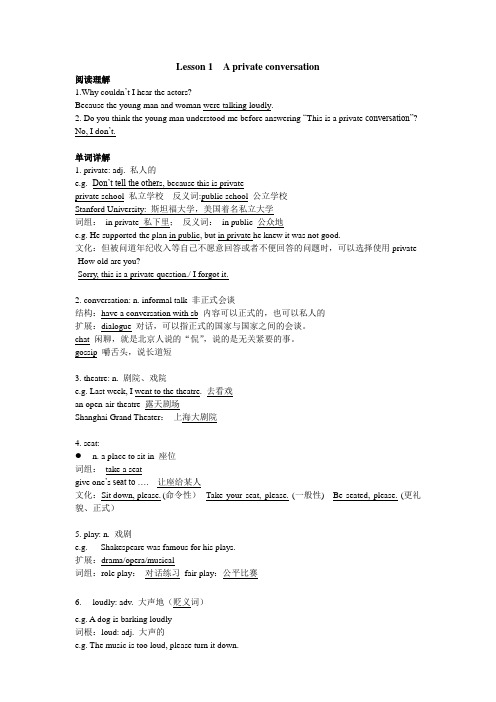
Lesson 1 A private conversation阅读理解1.Why couldn’t I hear the actors?Because the young man and woman were talking loudly.2. Do you think the young man understood me before answering “This is a private conversation”? No, I don’t.单词详解1. private: adj. 私人的e.g. Don’t tell the other s, because this is privateprivate school 私立学校反义词:public school 公立学校Stanford University: 斯坦福大学,美国着名私立大学词组:in private 私下里;反义词:in public 公众地e.g. He supported the plan in public, but in private he knew it was not good.文化:但被问道年纪收入等自己不愿意回答或者不便回答的问题时,可以选择使用private -How old are you?-Sorry, this is a private question./ I forgot it.2. conversation: n. informal talk 非正式会谈结构:have a conversation with sb 内容可以正式的,也可以私人的扩展:dialogue 对话,可以指正式的国家与国家之间的会谈。
chat 闲聊,就是北京人说的“侃”,说的是无关紧要的事。
gossip 嚼舌头,说长道短3. theatre: n. 剧院、戏院e.g. Last week, I went to the theatre. 去看戏an open-air theatre 露天剧场Shanghai Grand Theater:上海大剧院4. seat:n. a place to sit in 座位词组:take a seatgive one’s seat to …. 让座给某人文化:Sit down, please. (命令性)--Take your seat, please. (一般性) --Be seated, please. (更礼貌、正式)5. play: n. 戏剧e.g. Shakespeare was famous for his plays.扩展:drama/opera/musical词组:role play:对话练习fair play:公平比赛6. loudly: adv. 大声地(贬义词)e.g. A dog is barking loudly词根:loud: adj. 大声的e.g. The music is too loud, please turn it down.adv. 洪亮地(褒义词)e.g. Speaker louder, I can’t hear you.7. angry: adj.生气的e.g.我很生气。
新概念英语二册lesson1教师版讲义

指导课题:新观点 2 lesson1提分第一阶段:复习上节课内容和忘记知识点单词听写提分第二阶段:梳理本节课知识重点,查漏补缺1 A private conversation 个人讲话【课文】Last week I went to the theatre. I had a very good seat. The play was very interesting. I did not enjoy it. A young man and a young woman were sitting behind me. They were talking loudly. I got very angry. I couldnot hear the actors. I turned round. I looked at the man and the woman angrily. They did not pay any attention. In the end, I could not bear it. I turned round again. "I can't hear a word!" I said angrily."It's none of your business," the young man said rudely. "This is a private conversation!"【课文翻译】上星期我去看戏。
我的座位很好,戏很存心思,但我却没法赏识。
一青年男子与一青年女子坐在我的身后,高声地说着话。
我特别生气,由于我听不见演员在说什么。
我回过头去怒目着那一男一女,他们却绝不理睬。
最后,我忍不住了,又一次回过头去,生气地说:“我一个字也听不见了! ”“不关你的事,”那男的绝不客气地说,“这是个人间的讲话! ”【生词和短语】private (title) adj.个人的angry adj. 生气的conversation n. 讲话angrily adv.生气地theatre n. 剧场,剧场attention n. 注意seat n. 座位bear (bore, borne) v. 容忍play n. 戏business n. 事loudly adv.高声地rudely adv.无礼地,鲁莽地提分第三阶段:考试考点例题解说,掌握解题思路★private adj.个人的①adj. 个人的private life私生活private school私立学校It's my private letter.(假如妈妈想看你的信)It's my private house.(假如陌生人想进你的房屋)②adj. 一般的private citizen一般公民I ’ m a private citizen.(citizen n. 公民)private soldier大兵《Private Ryan》(《挽救大兵瑞恩》)public adj. 民众的,公然的(private 的反义词)public school公立学校public letter公然信public place公共场所privacy n.隐私It ’ s privacy. 这是我的隐私!( 不肯让他人知道的)★ conversation n.讲话have a + talk/chat/dialogue/conversation/gossip名词改动词conversation 一般用于正式文体中, 内容上常常不正式subject of conversation话题They are having a conversation.talk 内容可正式可不正式, 也能够个人Let ’ s have a talk.dialogue 对话 , 能够指正式国家与国家会商China and Korea are having a dialogue.chat 闲谈,就是北京人说的“侃”,说的是没关紧急的事。
- 1、下载文档前请自行甄别文档内容的完整性,平台不提供额外的编辑、内容补充、找答案等附加服务。
- 2、"仅部分预览"的文档,不可在线预览部分如存在完整性等问题,可反馈申请退款(可完整预览的文档不适用该条件!)。
- 3、如文档侵犯您的权益,请联系客服反馈,我们会尽快为您处理(人工客服工作时间:9:00-18:30)。
Lesson 1 A private conversation阅读理解1. Why couldn’t I hear the actors?Because the young man and woman were talking loudly.2. Do you think the young man understood me before answering “This is a private conversation”?No, I don’t.单词详解1. private adj. 私人的语境体验:【学生版不出现】女孩子们在讲八卦前最常说的一句话:Don’t tell the other s, because this is private词组:私立学校private school反义词:公立学校public school(扩展:西方很多著名高校都是私立的,如:Stanford University: 斯坦福大学,美国著名私立大学)【学生版不出现】词组:in private 私下地;反义词:in public 公众地e.g. He supported the plan in public, but in private he knew it was not good.文化:(但被问道年纪收入等自己不愿意回答或者不便回答的问题时,可以选择使用private)【学生版不出现】-How old are you?-Sorry, this is a private question./ I forgot it.2. conversation n. 谈话3. theatre n. 剧院、戏院4. seat n. 座位词组:give one’s seat to …. 让座给某人文化:Sit down, please. (命令性,【学生版不出现】比如老师与学生的对话) Take your seat, please. (一般性,【学生版不出现】比如公司同事)Be seated, please. (更礼貌、正式,【学生版不出现】比如国家大会奏完国歌以后)5. play n. 戏6. loudly adv. 大声地(贬义词)e.g. A dog is barking loudlyadv. 洪亮地(褒义词)e.g. Speak loudly because I can’t hear you.7. angry adj. 生气的结构:be angry with 对…生气翻译:我对这个粗心的护士很生气。
I was angry with the careless nurse.派生:angrily adv. 生气地anger n. 怒气、怒火8. attention n. 注意翻译:大家请注意!下课了!Attention, please! Class is over now.词组:pay attention to 注意…翻译:Please pay attention to this point, because I will test you on this. 注意这点词组:不理睬pay no attention to极大关注pay great attention to9. bear v. 容忍同义词组:stand / put up with10. business n. 事翻译:It’s none of your business. 不关你的事。
Business is Business. 公事公办。
Mind your own business! 不要狗拿耗子,多管闲事!11. rudely adv. 粗鲁地,不礼貌地rude adj. 粗鲁的课文解析1. Last week I went to the theatre. I had a very good seat. The play was very interesting. I did not enjoy it.●时态:一般过去时(详见“语法重点”)●词组:last week 上周; last year 去年都是过去时的时间状语●辨析:interesting V.S interestedinteresting表示特征,多修饰物;interested表示情绪,多修饰人填空:I am really interested in your interesting speech.2. A young man and a young woman were sitting behind me. They were talking loudly.●时态:过去进行时was/were doing翻译:昨天下午五点他们正在开心地看电影。
They were watching a movie happily at 5 yesterday afternoon.3. I got very angry. I couldn’t hear the actors.●词汇:get=become 变得,强调变化对比:I got angry. 我变得很生气。
V.S. I was angry. 我一直很生气。
模仿:她变瘦了。
She gets slim.她很瘦。
She is slim.●篇章:hear the actors指的是听到演员的说话声4. I turned round. I looked at the man and the woman angrily.●词组:turn round/around 转身turn to sb. 求助于(教学说明:老师口头可给出适当例句,让学生猜出上面词组的意思)【学生版不出现】●语法:angrily副词修饰动词look(详见“语法重点”)5. They did not pay any attention.●词组:not…any=no●结构:do not pay any attention = pay no attentione.g. They didn’t say any words. = They said no words.6. In the end, I could not bear it. I turned round again. ‘I can't hear a word!’ I said angrily.●词组:in the end = at last = finally 在最后7. ‘It's none of your business,’the young man said rudely. ‘This is a private conversation!’●口语:(It’s) none of your business = (It’s) none of pigeon. 不关你的事。
语法重点英语基本句型你知道英语有几种成分吗?主谓宾定状补表(教学说明:写在黑板上,请学生确定以下2句的成分。
)【学生版不出现】I ate a green apple quickly.I am Mary.英语常见句型:主语+谓语(不及物动词vi)例句:The sun rises.主语+谓语(及物动词vt.)+宾语例句:He plays football every day.主语+谓语(系动词be/get/become等)+表语例句:Leaves turn yellow in autumn.主语+谓语+宾语+补语例句:I found the garden interesting.(教学说明:可让学生看看课文中的句子是几号句型?)【学生版不出现】Exercise: 正确排序并说出句子成分。
(教学说明:可采用游戏的方式【学生版不出现】) ①ears/walls/haveWalls have ears. 主语+谓语(及物动词vt.)+宾语②quickly/the/car/beautiful/stoppedThe beautiful car stopped quickly. 主语+谓语(不及物动词vi)+状语③her brother/behind/she/sits/usually/in classShe usually sits behind her brother in class. 主语+谓语+状语●形容词副词的运用你知道英语中有多少词性吗?形容词修饰名词,作定语。
副词修饰动词,做状语。
e.g. a rude(粗鲁) manHe said very rudely(粗鲁)●一般过去时表示过去某个时间的动作和行为,常见时间状语有:…ago, yesterday, last…,in 1972 翻译:三分钟前他在这里。
He was here three minutes ago.否定句:He was not here three minutes ago.疑问句:Was he here three minutes ago?翻译:1974年他在这个工厂工作过。
He worked in this factory in 1974.否定句:He didn’t work in this factory in 1974.疑问句:Did he work in this factory in 1974?(教学说明:以上2种练习是be动词和行为动词的不同句型,是难点,可口头再多举几个简单例子,让学生临场“口译”;疑问句能否“倒转”为肯定句?)【学生版不出现】。
